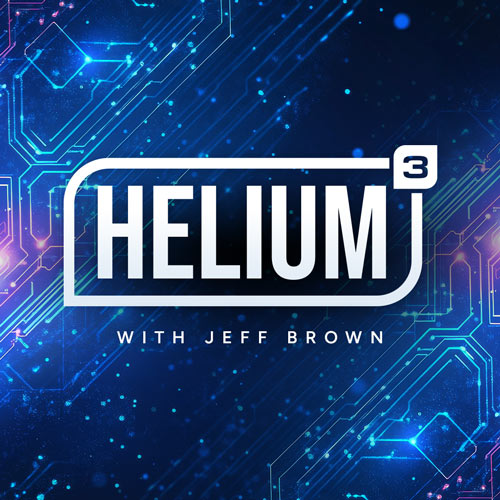It's wildly profitable - Over $3 billion in operating income. It has a partnership with the hottest AI stock on Wall Street.
And Trump has publicly backed it?

Three significant developments emerged this week that could fundamentally alter technology investment strategies through decade's end. From quantum computing's transition to commercial viability to explosive AI infrastructure demand, institutional and retail investors may face critical portfolio allocation decisions in the coming quarters.

Jeff Brown believes this little-known Seattle company (click here to get the name and details, 100% free)...
Will soon help unlock the full power of the next generation of AI, something he's calling Q-AI…
A new type of AI is so powerful that it could trigger a $100 trillion tech revolution…
And return 1,500x MORE money than Nvidia.
The technology sector delivered three significant announcements between October 6-7, 2025, that collectively could signal an acceleration in next-generation computing infrastructure. These developments span quantum computing commercialization, AI server demand exceeding projections, and a landmark chip partnership that may position AMD as a stronger Nvidia competitor.
Australian startup Diraq and European chip research giant imec demonstrated that silicon quantum chips can maintain over 99 percent fidelity when manufactured through standard semiconductor foundries. This breakthrough could help address one of the primary barriers to quantum computing commercialization: scalability.
Unlike previous demonstrations showing cherry-picked laboratory devices, Diraq's chips achieved fault-tolerance thresholds consistently across randomly selected production units. According to McKinsey, the quantum computing market generated approximately $650-750 million in revenue during 2024, and analysts project the sector could reach $72 billion by 2035, potentially representing a compound annual growth rate exceeding 30 percent.
Pure-play quantum stocks have surged dramatically in 2025. IonQ (IONQ) trades at approximately a $23 billion market capitalization despite modest current revenues, up roughly 75 percent year-to-date. Rigetti Computing (RGTI) has jumped approximately 162 percent, while D-Wave Quantum (QBTS) has soared around 289 percent. However, these valuations may price in optimistic growth scenarios. IBM (IBM) offers an alternative approach with established quantum research, current profitability, and a dividend yield near 2.4 percent, alongside stated plans for fault-tolerant quantum systems by 2029.

George Gilder has identified 9 major tech convergences throughout history. Each created massive new wealth for the few who saw it coming.
The microchip. The internet. The iPhone. Qualcomm's wireless revolution.
Now he's tracking something he calls "Convergence X" - and he says a bombshell October 16th announcement is when it goes mainstream.
Three companies sit at the epicenter.
Dell Technologies (DELL) surprised markets October 7 by roughly doubling its growth forecasts through fiscal 2030. The company now projects annual revenue growth of 7-9 percent and earnings per share growth exceeding 15 percent, up from previous guidance of 3-4 percent revenue growth and 8 percent EPS growth.
According to IDC data, Dell is among the leading AI infrastructure providers. The company expects to ship approximately $20 billion in AI servers during fiscal 2026 alone—potentially double the previous year. Major customers reportedly include CoreWeave, Elon Musk's xAI, and numerous hyperscalers racing to deploy massive AI data centers. Dell shares rose 3.8 percent to approximately $151 on the announcement, becoming the S&P 500's top performer that session.
The guidance increase suggests AI infrastructure demand may be exceeding even bullish projections. Dell's partnerships with Nvidia (NVDA) for computing platforms, combined with management's stated commitment to return over 80 percent of adjusted free cash flow to shareholders, could create an attractive risk-reward profile relative to some pure-play chip stocks trading at premium valuations.
AMD (AMD) announced a blockbuster multi-year agreement October 6 to supply 6 gigawatts of computing capacity to OpenAI using AMD Instinct MI450 GPUs starting late 2026. AMD issued OpenAI a warrant for up to 160 million shares, potentially giving OpenAI up to a 10 percent stake as deployment milestones are achieved.
AMD shares jumped approximately 24 percent, adding roughly $63.4 billion in market value and bringing total capitalization to approximately $330.6 billion. Bank of America analyst Vivek Arya estimates the agreement could potentially generate over $100 billion in cumulative revenue over four to six years, with potential earnings power that could exceed $15 per share by 2030, assuming full deployment and 35 percent operating margins are achieved.
The partnership may strengthen AMD's competitive position relative to Nvidia and reflects OpenAI's apparent strategy to diversify infrastructure suppliers. However, warrant vesting is tied to AMD achieving specific share price targets up to $600 and meeting deployment milestones—indicating significant execution risk if technical or commercial objectives are not met.
These three developments present distinct risk-reward profiles across the technology infrastructure spectrum. More conservative investors may consider Dell and IBM for their established businesses with actual cash flows and dividends, while gaining exposure to AI and quantum growth trends. Dell trades at valuations that may appear reasonable compared to some chip stocks, while IBM offers quantum exposure with potentially more downside protection.
Growth-oriented investors might consider AMD for direct OpenAI partnership exposure, though the potential $100+ billion revenue opportunity depends heavily on successful execution over multiple years. Pure-play quantum stocks like IonQ, Rigetti, and D-Wave offer potential high-growth upside but carry substantial downside risk given minimal current revenues and speculative valuations.
For diversified exposure, semiconductor ETFs like VanEck Semiconductor (SMH) and cloud computing funds like First Trust Cloud Computing (SKYY) provide sector participation without single-stock concentration risk. Given the elevated valuations across much of the technology infrastructure sector, investors may wish to carefully consider their overall allocation to these themes and consult with financial advisors regarding appropriate portfolio positioning based on individual circumstances and risk tolerance.
The coming quarters may reveal whether quantum commercialization, AI infrastructure buildout, and chip supplier diversification can deliver on their ambitious projections or whether current valuations reflect excessive optimism.
Disclaimer: This article is for informational purposes only and should not be considered personalized investment advice. Past performance does not guarantee future results. All investments carry risk, including potential loss of principal. The statistics, projections, and analyst estimates referenced are subject to change and may not be realized. Always conduct your own research and consult with a qualified financial advisor before making investment decisions.
View Sources: Bloomberg, CNBC, McKinsey Quantum Technology Monitor 2025, Nature Journal, AMD Investor Relations, Dell Technologies Investor Relations, Bank of America Securities Research, IDC Artificial Intelligence Infrastructure Tracker, ScienceDaily, TechCrunch, Seeking Alpha, The Motley Fool, Fortune Business Insights, Grand View Research
President Trump promised to make America the leader of artificial intelligence.
That's why Jeff Brown believes he's about to grant what he calls "national security status" to this little-known company…
Sending shares higher than anyone can imagine.
This is the only company in the U.S. that can mine a metal that's critical to the $100 trillion AI boom.
Donald Trump just won the election resoundingly. And already, in the first few hours after the news, Bitcoin has skyrocketed. Hitting all-time highs on the first day after the election. But that’s just the start …
Juan Villaverde called the top and bottom of every crypto bull market since 2012. And he says 2025 could be the greatest bull market in crypto history. He believes Bitcoin will go to $150,000 — or more.
But there’s one coin he thinks could go even higher. It’s part of Trump’s special Project Crypto. His plan to make America “the crypto capital of the planet.” This could be his favorite coin.
And it’s definitely one of his vice president’s favorite. Click here to find out more about the coin that makes more than Bitcoin in the 2025 bull market.
Jeff Brown believes Trump is about to grant "national security status" to this little-known company. This is the only company in the U.S. that can mine a metal that's critical to the $50 trillion AI boom. A virtual monopoly with massive potential.
It's wildly profitable - Over billion in operating income. It has a partnership with the hottest AI stock on Wall Street. And Trump has publicly backed it? Get the details on this #1 AI energy stock opportunity.
A revolutionary new robot is beginning to emerge. Elon Musk says it will "change civilization as we know it." Microsoft's Bill Gates said, "it will be as revolutionary as the PC." Creating a trillion dollar opportunity for investors.
TechStockMovers.com, a brand under Market Insiders Media dba, operates under the parent company Sandpiper Marketing Group, LLC. Please be advised that TechStockMovers.com is not registered as an investment adviser or broker-dealer with the United States Securities and Exchange Commission or any state regulatory agency. We rely on the "publisher's exclusion" from the definition of investment adviser as set forth in Section 202(a)(11) of the Investment Advisers Act of 1940, as amended, as well as corresponding state securities laws. Consequently, TechStockMovers.com does not offer or provide personalized investment advice.
The information we provide is based on our opinions, statistical and financial data, and independent research of public information. Our materials are intended for informational purposes only, and no mention of a specific security in any of our content constitutes a recommendation to buy, sell, or hold that or any other security. Any information deemed to be investment opinion is impersonal and not tailored to the investment needs of any individual.
Please be aware that TechStockMovers.com does not promise, guarantee, or imply that any information provided through our websites, newsletters, reports, or printed material will result in profit or loss. We strongly encourage you to seek personal advice from your professional investment, tax, or legal advisors and to conduct your own due diligence and independent investigations before acting on any information we publish or making any investment decision. Only you and your professional advisors can determine the level of risk appropriate for you. Penny stocks, in particular, are inherently speculative investments, and you should be prepared to lose your entire investment.
Employees, owners, and/or writers of TechStockMovers.com may own positions in the equities, options, and/or securities mentioned in our content. However, no associated employees will intentionally engage in any transaction that directly or indirectly competes with the interests of our subscribers. TechStockMovers.com may be compensated for publishing information about companies referred to in our reports, newsletters, and websites, and we provide full disclosure of such compensation.
Furthermore, please note that any content marked as "Sponsor" may be paid for and is not endorsed or warranted by our staff or company. The content in our emails is for educational or entertainment use and is not a substitute for professional advice or an offer to buy or sell any securities. Neither the publisher nor the editors are registered investment advisors (RIA’s) and do not provide personalized counseling. Be sure to conduct your own careful research and consult with your advisors before taking any action based on our content. By opening our emails or clicking any links contained therein, you are reconfirming your opt-in status, which is part of your free subscription.